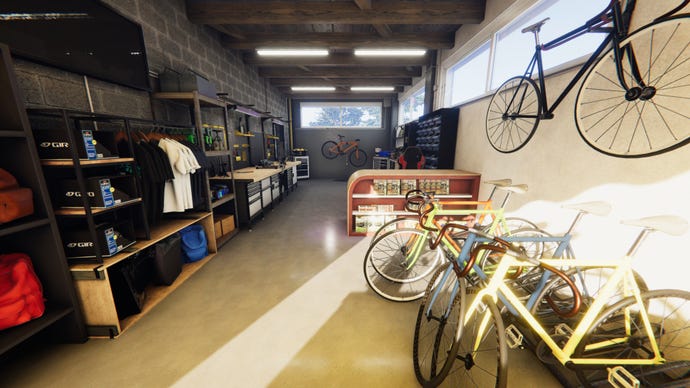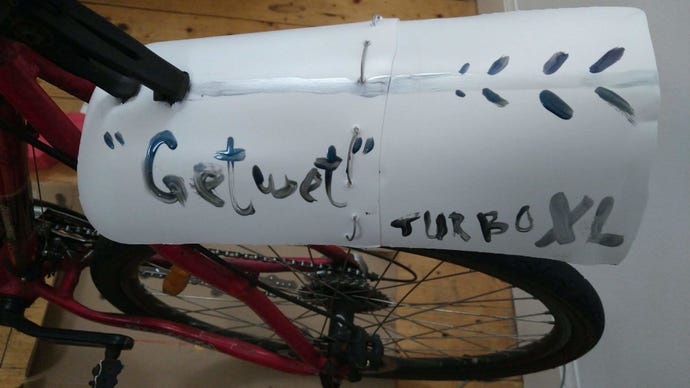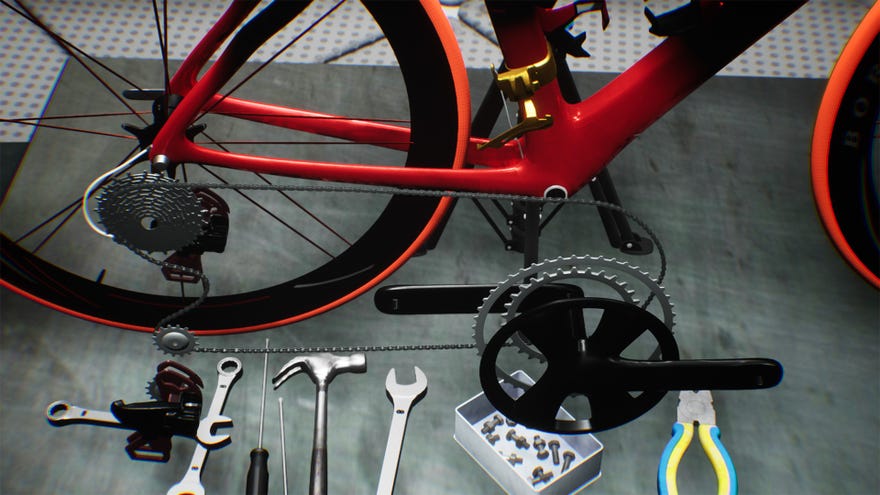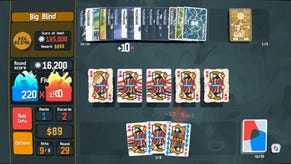Bicycle repair could make for a great puzzle game
I crave investigating faults and screwing up repairs
After the last stage of my Tour De Jeux gave me a flat tyre on my real bike, I started daydreaming about a bike repair game. A grubby game with fuzzy deductive puzzles as you rule out the many possible causes of similar symptoms. As far as I can find, no such game exists. But I did see two upcoming games with similar names: Bicycle Mechanic Simulator and Bike Mechanic Simulator 2023. Alas, I fear they might be PlayWay-style sims where you just click stuff in order then it all works tickety-boo. That is not the bike repair I know and begrudgingly enjoy.
In both games, you'll run your own bike workshop. You'll assemble bikes, repair bikes, and collect bikes. I'm being vague because all I have to go on for now is the scant marketing materials on the Steam pages for Bike Mechanic Simulator 2023 (due to launch in 2023, obvs) and Bicycle Mechanic Simulator (launch TBA). They look like they might fall into the standard shape of the 'X Simulator' games made by companies like PlayWay, but I hope not.
Even the most detailed simulator is abstracted, cutting and simplifying elements because we can't run reality in real-time on a desktop PC. The interesting decision is where you draw this jagged line. For me, PlayWay-style sims trim too much. They often turn complex, fuzzy procedures into a series of of tasks where you click the bit you're told to click in the order you're told to click them until it's all done, like PowerPoint presentations with real-time 3D graphics. While I understand the appeal of a gentle game dressed up like your hobby, that's not what I'm dreaming of.

I think bike repair could make for interesting and challenging puzzles with investigative diagnosis, careful procedures, some capacity for bodges, and the risk of screwing up. A bicycle is fundamentally quite a simple mechanical device: tubes, a few parts which spin or turn, then cable, chain, rubber, bolts, levers, and bearings to bind them and speed you along. In theory, this device should be simple to fix. In reality, ha!
So many processes are analogue, about feel or balance or intuition, and adjusting to each rider's needs and desires. Making a wonky wheel run true by tightening specific spokes, for example, is wizardy as far as I'm concerned. Then you have the mysteries of components following many incompatible competing standards, and the ability to put things together incorrectly (god help you if you forget which few parts are threaded to screw in the opposite direction and try to muscle through), and invisible mistakes like rotting your brakes from the inside by using the wrong type of hydraulic fluid. Little is just 'do this until done'.
My heart sank a little when Bicycle Mechanic Simulator's trailer implied the game might automatically thread the chain through a rear derailleur (the bit which changes a back wheel's gears) for you. If you can't commit the rookie mistake of picking a wrong route through the spring-loaded jaws and not noticing until you hear a hellish rattlegrind, is it even bike repair? But again, I am only guessing from screenshots and short trailers.
Maybe these games will let you forget the order to reassemble a freehub's nuts, bearings, seals and such, as I certainly have (always take a photo!). Maybe you will be free to pump hydraulic brakes while the wheel is removed, spraying mineral oil around your lounge (welp). Maybe you can absentmindedly overtighten a mudguard bolt until friction melts the plastic washer (shut up, okay). Look, a professional shop once admitted to being so flummoxed by my old bike's brakes that they just banged on a couple washers to forcefully adjust spacing. It wasn't elegant but hey, it worked. They would earn a ★☆☆ rating for that puzzle solution.
My most/least favourite stage of bike repair is identifying unobvious issues by sound. Rotate a pedal by hand a bit and listen for creaks, scrapes, squeaks, or rubs. Put your ear up close and try to isolate it. Now press on this part, squeeze those, give that one a spin, and wiggle them (while remembering that not all wiggles are bad). But maybe a troublesome noise only manifests when actually riding, or going hard. It can be difficult to hear while riding because not only are many parts grouped together, noises can move through a bike frame and sound like they're coming from somewhere else. Hell, maybe you're stumped because a mystery squeak is not the bike at all, it's the cleat on your cycling shoe. (And while I've no experience with carbon fibre, I know one common technique for assessing suspected cracks is tapping it to check for a different sound.) This sonic process is sometimes frustrating to work through but always delightful to have solved. I might very much enjoy this in a video game.

Is my vague wish game actually edutainment? Do I want edutainment? Maybe. But I feel there's plenty of fun puzzling potential in complex repairs, elusive faults, abused bikes, and esoteric vintage components (like the retro-direct gearing where you sometimes pedal backwards, and modern reimaginings thereof). And what will you do if a customer wants their bike customised in ways that will doubtless cause problems for them later? Good opportunities for story and personality with repeat customers too—and humour if you need to fix their horrifying DIY bodges. Some bicycles seem held together by hose clips, frame bags, oily clumps of dog hair, and a vow to spite god.
Like many who got back into cycling during Covid-19, I had a neglected bike in need of work—and repair shops were backlogged with all of us. So like other brave fools, I tried to fix some bits myself. I did seek guidance, mind. While normally I learn by breaking things then figuring it out as I fix them in a panic, the weeks-long wait for professional backup made this too risky. The greatest resource was London Bike Kitchen's Hex Education, a course of lessons over Zoom. That gave me enough confidence with the fundamentals to then tackle bigger tasks with the help of Sheldon Brown's encyclopediac knowledge and Park Tool's YouTube videos. Now when I broke things, I felt equipped to recover (I like LBK's motto: "fix shit or cry trying"). I am still far from expert, and arguably yet to attain mere competence (I leave big jobs on my better bike to professionals), but I am able and happy to fix a lot by myself. I've even worked on bikes for my pals, and they're all alive. Currently alive. It feels good. Currently.










